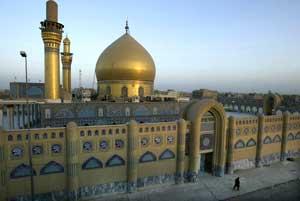A shorter history of violence
 Mark Seibel at McClatchy delivers a good article revolving around Bush and various administration officials' statements that the civil strife all started with the bombing of the Samarra mosque. It's a resounding rebuke of White House officials, replete with a great deal of discussion about the expanding program of sectarian violence extant well before the Samarra bombing. Rebuking White House officials, however, is not a difficult thing to do these days.
Mark Seibel at McClatchy delivers a good article revolving around Bush and various administration officials' statements that the civil strife all started with the bombing of the Samarra mosque. It's a resounding rebuke of White House officials, replete with a great deal of discussion about the expanding program of sectarian violence extant well before the Samarra bombing. Rebuking White House officials, however, is not a difficult thing to do these days.President Bush and his aides, explaining their reasons for sending more American troops to Iraq, are offering an incomplete, oversimplified and possibly untrue version of events there that raises new questions about the accuracy of the administration's statements about Iraq.My only quibble with Seibel is his use of the adjective "possibly." The extent of sectarian vengeance was widely reported for well over a year before the Samarra mosque. The much publicized November, 2005 raid by US forces of an Interior Ministry building, which pulled 169 starved, tortured Sunnis out of the basement, demonstrated just how much the Iraqi government itself was one of the major players in the strife.
Unfortunately, Seibel manages not to mention how much this behaviour on the part of the Interior Ministry is likely the direct result of Donald Rumsfeld's belief that one way to quell the troubling insurgency was by training Iraqis to operate as death squads, which the Pentagon then labeled "The Salvador Option." It was not known at the time whether this "plan" was ever implemented, though the subsequent, exposed behaviour of the Interior Ministry seemed to more than adequately demonstrate that, indeed, the Salvador Option had been exercised. Word of the Salvador Option first broke over a year before the Samarra mosque was blown up.
While Bush and his band of misinformers are blaming and will continue to blame, Tehran for backing Shiite militias, which they almost certainly are doing, the Pentagon, too, has clearly had a hand in backing SCIRI's Badr Brigade, long thought to have infiltrated various security forces in Iraq.
Once again, Bush has chosen to define history in very limited terms. He cites job growth from August 2003, as though he wasn't even around for the two and half years before that date when the country was haemorrhaging jobs. And here, Bush speaks of the history of violence in Iraq from the fixed and certain date of the Samarra bombing, as though things were going swimmingly -- a landscape of "enormous successes" as Cheney would say -- until that moment. It is the same truncated historicity of world events that sees them comparing Bush to Harry Truman, or even more hilariously, Lincoln.


0 Comments:
Post a Comment
<< Home